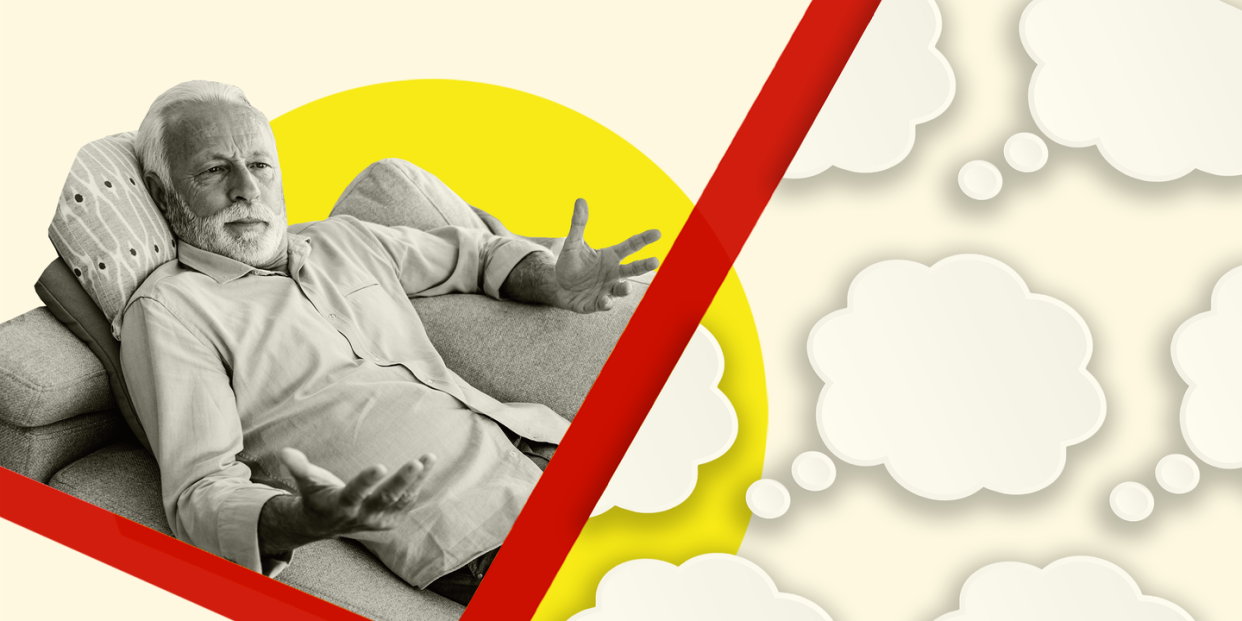Your Therapist Isn’t Working Out. Here’s How to Say Goodbye.

You've heard about the Great Resignation, but quitting your job is just one way that throwing in the towel can be a great way to get ahead. This story is part of a Men's Health series on how real-life quitters became winners—and how you can join them.
SO YOU'VE FOUND a therapist, and you’ve passed those first few “getting to know you” sessions. There’s just one problem: your therapist. Sometimes the mental health professionals we work with aren’t a good match. Psychiatrist Dr. Gregory Scott Brown, M.D. reveals what you should look out for, and how to tell them they’re not the one.
You’re Just Not Getting Anything Out Of It
There’s no hard and fast rule on when you’ll get a breakthrough in therapy (or if you’ll have one at all). But once you’ve set your expectations and goals with a therapist, you should pay attention to how you feel after each session. “You’re not going to leave every session feeling happy per se, but if week after week after week, you’re just feeling like you’re not going anywhere, you’re not getting better, and those insights aren’t occurring, that might be really indicative that it’s time to have that conversation,” Brown says.
Your Personalities Don’t Match
A therapist shouldn’t be your best friend. But they also shouldn’t be your worst enemy. Brown says a good relationship with a therapist should have “healthy tension.” “Therapy should be rewarding. It should be challenging,” Brown says. “It should be hard. You know, it should be enlightening.”
In other words, therapy isn’t for gossiping about your friends or complaining about work. You need a person who you can trust with your emotions, but still push back when needed. “Almost all my therapy patients at some point have cried during therapy, even the most stoic guys have shed tears,” Brown says.
One way to gauge your compatibility: a pre-interview. Some therapists will do 10-minute calls to learn more about you and your goals. It’s a way for you to ask questions and get to know them too, so you can see if it’s worth meeting them for a session.
Or Maybe You’re Just Feeling Better
After a while, your sessions may reach a natural end. Sometimes, it means setting a new goal to work toward. Or it could mean ending the relationship entirely. “I think a lot of times people think...once you join therapy or start working in therapy, it’s something you’re going to have to do for years and decades,” says Brown.
But that’s not true for everyone. “A lot of people will find that after several sessions they learn coping skills, they’ve done the psychodynamic work, and really stopped the cause of whatever brought them there in the first place,” says Brown.
So, Don’t Feel Bad About Leaving
People ditch their therapists all the time for various reasons, and as Brown says, therapists are used to hard or uncomfortable talks.
“Mental health professionals are exactly that, they’re pros, they’re used to having these conversations, they welcome these conversations,” Brown says. “The most important thing I want readers to know is that if they feel any sort of discomfort or tension, or feel like it’s time to quit, talk to the therapist about it.”
And be honest about why it’s not working. If you’re not happy with what you’re focusing on in therapy, talk about where you want to redirect your sessions. If you’re looking for a therapist who shares a part of your identity such as sexual orientation, religion, or race, your current therapist may have recommendations. And if you want to take a break from therapy, that’s also worth discussing.
“It might involve conversations about signs to look out for that might indicate when maybe it’s time to come back to therapy,” Brown says. “And in mental health care we also talk about a transitional object, that might be a rock or a bracelet to remind a patient of the work they did in those sessions.”
...But Don’t Just Quit
Like leaving a job or ending any other professional relationship, you want to give your therapist notice before you decide to stop seeing them. Even if they’re just not the right fit, it’ll give you both time to prepare for whatever is next, whether that’s transitioning to a new therapist or stopping therapy completely. Quitting without a plan could be an emotional challenge.
“It’s like any relationship,” Brown says. “Patients are going to be saying things to their therapists in some cases they haven’t told anyone else. So it is a relationship, and just like any other relationship, if you end it, that could be a traumatic moment, even if you don’t feel that you’re getting much out of it. So I think if you have time to make that transition whether it’s two or three weeks, or two or three months, I think it’s always best [to tell your therapist].”
You Might Also Like

